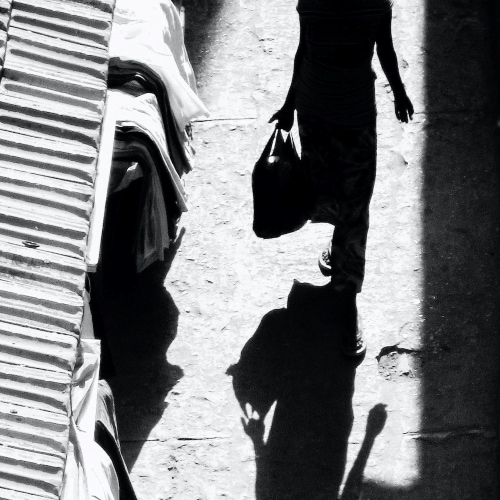The past decade has been increasingly marked by the movement of bodies across political borders. Whether fleeing violence or working within new labor regimes, diasporic communities have sought livelihoods outside of their native land and become major social groups within and across states. Anthropological works responding to migration have abounded, exploring not only migrants’ encounters with physical borders, but also the metaphorical borders that emerge within their new homes. We’ve chosen the following reads as some of the best explorations of peoples’ movement, particularly in relation to belonging and citizenship, refugee education, as well as the waiting, hope, or disappointment that can mark transitional livelihoods. If you are interested in reviewing one of these books, get in touch with us!
How to Proceed:
As we receive many requests for reviews, please send an email to reviews@allegralaboratory.net indicating which book you would like to review, your postal address, and 2-3 sentences explaining why you should be reviewing the book. Please explain how the book relates to your own research or interests. We will get back to you once we have selected the reviewers.
Khan, Nichola. Arc of the Journeyman: Afghan Migrants in England. University of Minnesota Press, 2021.
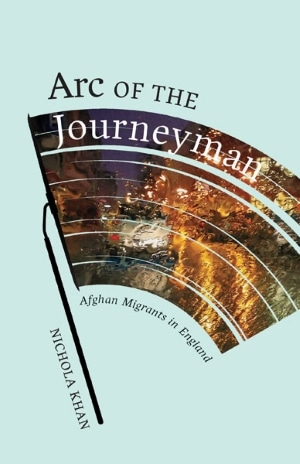 Forty years of continuous war and conflict have made Afghans the largest refugee group in the world. In this first full-scale ethnography of Afghan migrants in England, Nichola Khan examines the imprint of violence, displacement, kinship obligations, and mobility on the lives and work of Pashtun journeyman taxi drivers in Britain.
Forty years of continuous war and conflict have made Afghans the largest refugee group in the world. In this first full-scale ethnography of Afghan migrants in England, Nichola Khan examines the imprint of violence, displacement, kinship obligations, and mobility on the lives and work of Pashtun journeyman taxi drivers in Britain.
Hage, Ghassan. The Diasporic Condition: Ethnographic Explorations of the Lebanese in the World. University of Chicago Press, 2021.
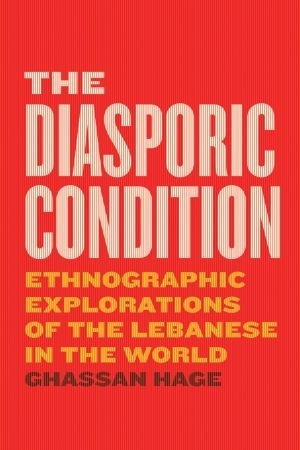 Bridging the gap between migration studies and the anthropological tradition, Ghassan Hage illustrates that transnationality and its attendant cultural consequences are not necessarily at odds with classic theory.
Bridging the gap between migration studies and the anthropological tradition, Ghassan Hage illustrates that transnationality and its attendant cultural consequences are not necessarily at odds with classic theory.
In The Diasporic Condition, Ghassan Hage engages with the diasporic Lebanese community as a shared lifeworld, defining a common cultural milieu that transcends spatial and temporal distance—a collective mode of being here termed the “diasporic condition.” Encompassing a complicated transnational terrain, Hage’s long-term ethnography takes us from Mehj and Jalleh in Lebanon to Europe, Australia, South America, and North America, analyzing how Lebanese migrants and their families have established themselves in their new homes while remaining socially, economically, and politically related to Lebanon and to each other.
At the heart of The Diasporic Condition lies a critical anthropological question: How does the study of a particular sociocultural phenomenon expand our knowledge of modes of existing in the world? As Hage establishes what he terms the “lenticular condition,” he breaks down the boundaries between “us” and “them,” “here” and “there,” showing that this convergent mode of existence increasingly defines everyone’s everyday life.
Dimova, Rozita. Border Porosities: Movements of People, Objects, and Ideas in the Southern Balkans, Manchester University Press, 2021.
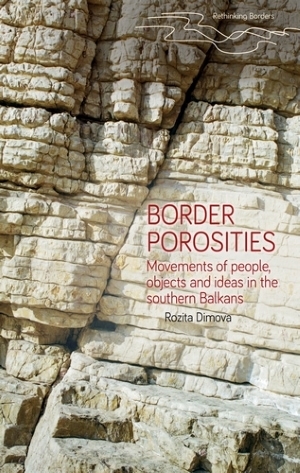 This innovative book documents border porosities that have developed and persisted between Greece and North Macedonia over different temporalities and at different localities. By drawing on geology’s approaches to studying porosity, Dimova argues that similar to rocks and minerals that only appear solid and impermeable, seemingly impenetrable borders are inevitably traversed by different forms of passage.
This innovative book documents border porosities that have developed and persisted between Greece and North Macedonia over different temporalities and at different localities. By drawing on geology’s approaches to studying porosity, Dimova argues that similar to rocks and minerals that only appear solid and impermeable, seemingly impenetrable borders are inevitably traversed by different forms of passage.
The rich ethnographic case studies, from the history of railroads in the southern Balkans, border town beauty tourism, child refugees during the Greek Civil War, mining and environmental activism, and the urban renovation project in Skopje, show that the political borders between states do not only restrict or regulate the movement of people and things, but are also always permeable in ways that exceed state governmentality.
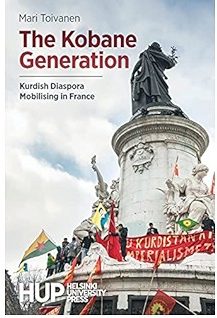 Toivanen. Mari. The Kobane Generation. Kurdish Diaspora Mobilising in France. Helsinki University Press, 2021.
Toivanen. Mari. The Kobane Generation. Kurdish Diaspora Mobilising in France. Helsinki University Press, 2021.
A small Kurdish city located in northern Syria, Kobane, became symbolically significant when ISIS laid siege to the city between September 2014 and January 2015. This pivotal moment in the fight against ISIS threw the international spotlight on the Kurds. The Kobane Generation analyses how Kurdish diaspora communities mobilised in France after the breakout of the Syrian civil war and political unrest in Turkey and Iraq in the 2010s. Tens of thousands of people, mostly but not exclusively diaspora Kurds, demonstrated in major European capitals, expressed their solidarity with Kobane, and engaged in transnational political activism towards Kurdistan.
In this book, Mari Toivanen discusses a series of critical events that led to different forms of transnational participation towards Kurdistan. The focus of this book is particularly on how diaspora mobilisations became visible among the second generation, the descendants of Kurdish migrants. The book addresses important questions, such as why second-generation members felt the need to mobilise and what kind of transnational participation this led to. How did the transnational participation and political activism of the second generation differ from that of their parents, and is such activism simply diasporic or also related to more global changes in political activism?
The Kobane Generation offers important insights on the generational dynamics of political mobilisations and their significance to understanding diaspora contributions. More broadly, it sheds light on second-generation political activism beyond the diaspora context, analysing it in relation to global transformations in political subjectivities.
Sur, Malini. Jungle Passports: Fences, Mobility, and Citizenship at the Northeast India-Bangladesh Border. Pennsylvania University Press, 2021.
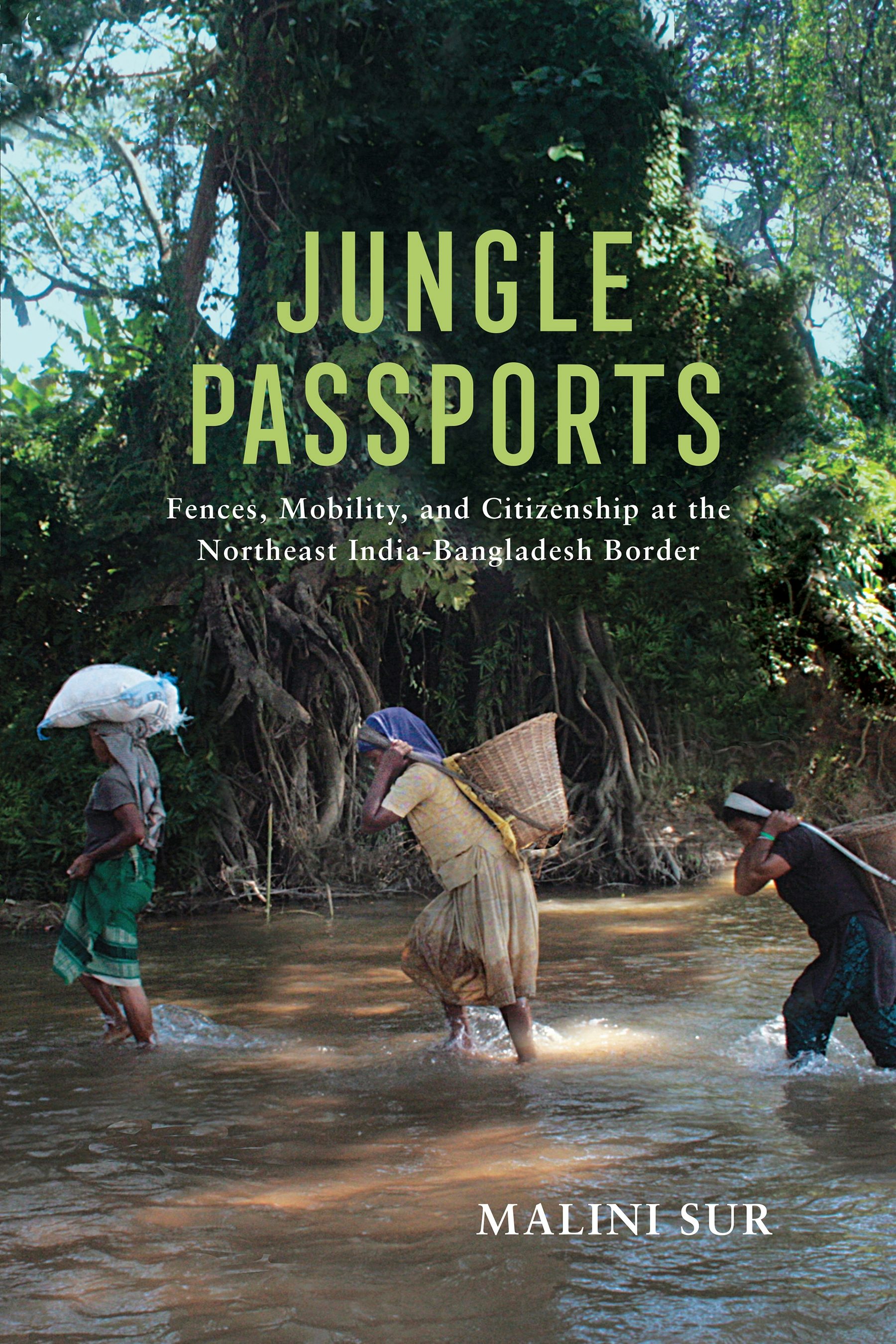
Since the nineteenth century, a succession of states has classified the inhabitants of what are now the borderlands of Northeast India and Bangladesh as Muslim “frontier peasants,” “savage mountaineers,” and Christian “ethnic minorities,” suspecting them to be disloyal subjects, spies, and traitors. In Jungle Passports Malini Sur follows the struggles of these people to secure shifting land, gain access to rice harvests, and smuggle the cattle and garments upon which their livelihoods depend against a background of violence, scarcity, and India’s construction of one of the world’s longest and most highly militarized border fences.
Jungle Passports recasts established notions of citizenship and mobility along violent borders. Sur shows how the division of sovereignties and distinct regimes of mobility and citizenship push undocumented people to undertake perilous journeys across previously unrecognized borders every day. Paying close attention to the forces that shape the life-worlds of deportees, refugees, farmers, smugglers, migrants, bureaucrats, lawyers, clergy, and border troops, she reveals how reciprocity and kinship and the enforcement of state violence, illegality, and border infrastructures shape the margins of life and death. Combining years of ethnographic and archival fieldwork, her thoughtful and evocative book is a poignant testament to the force of life in our era of closed borders, insularity, and “illegal migration.”
Elliott, Alice. The Outside. Migration as Life in Morocco. Indiana University Press, 2021.
 What does migration look like from the inside out? In The Outside, Alice Elliot decenters conventional approaches to migration by focusing on places of departure rather than arrival and rethinks migration from the perspective of those who have not (yet) left. Through an intimate ethnography of towns and villages notorious in Morocco for their striking emigration to “the outside,” Elliot traces the powerful ways migration permeates life: as brutal bureaucratic machinery administering hope and despair, as intimate force crisscrossing kinship relations and bonds of love and care, as imaginative horizon of the self and of the future. Challenging dominant understandings of migration and their deadly consequences by centering non-migrants’ sharp theorizations and intimate experiences of “the outside,” Elliot recasts migration as a deeply relational entity, and attends to the ethnographic, conceptual, and political imagination required by the constitutive relationship between migration and life.
What does migration look like from the inside out? In The Outside, Alice Elliot decenters conventional approaches to migration by focusing on places of departure rather than arrival and rethinks migration from the perspective of those who have not (yet) left. Through an intimate ethnography of towns and villages notorious in Morocco for their striking emigration to “the outside,” Elliot traces the powerful ways migration permeates life: as brutal bureaucratic machinery administering hope and despair, as intimate force crisscrossing kinship relations and bonds of love and care, as imaginative horizon of the self and of the future. Challenging dominant understandings of migration and their deadly consequences by centering non-migrants’ sharp theorizations and intimate experiences of “the outside,” Elliot recasts migration as a deeply relational entity, and attends to the ethnographic, conceptual, and political imagination required by the constitutive relationship between migration and life.
Walters, William, Charles Heller, and Lorenzo Pezzani. Viapolitics: Borders, Migration, and the Power of Locomotion. Duke University Press, 2022.
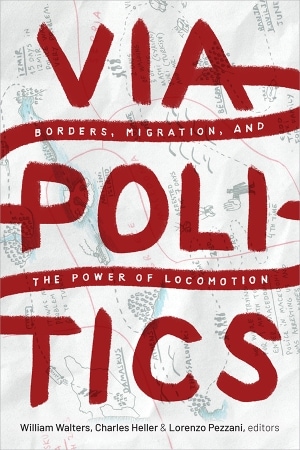 Vehicles, their infrastructures, and the environments they traverse are fundamental to the movement of migrants and states’ attempts to govern them. This volume’s contributors use the concept of viapolitics to name and foreground this contested entanglement and examine the politics of migration and bordering across a range of sites. They show how these elements constitute a key site of knowledge and struggle in migratory processes and offer a privileged vantage point from which to interrogate practices of mobility and systems of control in their deeper histories and wider geographic connections. This transdisciplinary group of scholars explores a set of empirically rich and diverse cases: from the Spanish and European authorities’ attempts to control migrants’ entire trajectories to infrastructures of escort of Indonesian labor migrants; from deportation train cars in the 1920s United States to contemporary stowaways at sea; from illegalized migrants walking across treacherous Alpine mountain passes to aerial geographies of deportation. Throughout, Viapolitics interrogates anew the phenomenon called “migration,” questioning how different forms of contentious mobility are experienced, policed, and contested.
Vehicles, their infrastructures, and the environments they traverse are fundamental to the movement of migrants and states’ attempts to govern them. This volume’s contributors use the concept of viapolitics to name and foreground this contested entanglement and examine the politics of migration and bordering across a range of sites. They show how these elements constitute a key site of knowledge and struggle in migratory processes and offer a privileged vantage point from which to interrogate practices of mobility and systems of control in their deeper histories and wider geographic connections. This transdisciplinary group of scholars explores a set of empirically rich and diverse cases: from the Spanish and European authorities’ attempts to control migrants’ entire trajectories to infrastructures of escort of Indonesian labor migrants; from deportation train cars in the 1920s United States to contemporary stowaways at sea; from illegalized migrants walking across treacherous Alpine mountain passes to aerial geographies of deportation. Throughout, Viapolitics interrogates anew the phenomenon called “migration,” questioning how different forms of contentious mobility are experienced, policed, and contested.
Kefale, Asnake and Fana Gebresenbet, eds. (2021) Youth on the Move: Views from Below on Ethiopian International Migration. Hurst, August 2021.
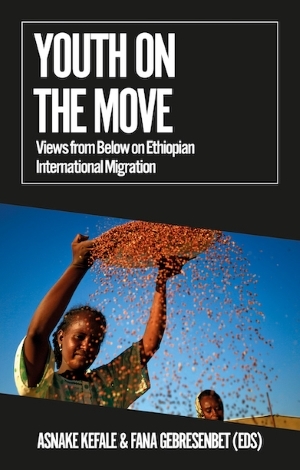 At a time when policies are increasingly against it, international migration has become the subject of great public and academic attention. This book departs from the dominant approach of studying international migration at macro level, and from the perspective of destination countries. The contributors here seek to do more than ‘scratch the surface’ of the migration process, by foregrounding the voices and views of Ethiopian youth–potential migrants and returnees–and of their sending communities.
At a time when policies are increasingly against it, international migration has become the subject of great public and academic attention. This book departs from the dominant approach of studying international migration at macro level, and from the perspective of destination countries. The contributors here seek to do more than ‘scratch the surface’ of the migration process, by foregrounding the voices and views of Ethiopian youth–potential migrants and returnees–and of their sending communities.
The volume focuses on the perspective and agency of these young people, both potential migrants and returnees, to better understand migration decision-making, experiences and outcomes. It brings together rarely documented cases of young men and women from several communities across Ethiopia, migrating to the Gulf and South Africa. Explaining the agency of local actors–prospective migrants, brokers and sending families–Youth on the Move illuminates the pervasive, persistent failure of state attempts to regulate migration. Moreover, it examines the financing of migration and the sharing of remittances, within a culturally situated moral economy. While accounts centred on economics and political violence are important, the contributors demonstrate compellingly that these factors alone cannot provide a full understanding of migration’s complexity, nor of its social realities.
Schühle, Judith. Traversing Transnational Biomedical Landscapes. An Ethnography of the Experiences of Nigerian Trained Physicians Practicing in the US and UK. Transcript, 2020.
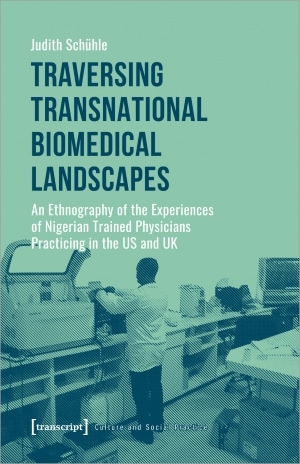 In the age of globalization, the transnational dimension of sciences like medicine seems to be given. However, the agents connecting different parts of this transnational biomedical landscape have yet to receive their due attention. Situated at the intersection of contemporary debates as well as theories of medical anthropology and migration in the 21st century, this book explores the experiences of Nigerian trained physicians who migrated to the US and the UK within the last 40 years. By drawing on individual professional life stories, Judith Schühle illuminates how these physicians disconnect from and (re)connect to diverse local social and biomedical contexts, becoming established abroad while at the same time trying to influence health care services in Nigeria through transnational endeavors.
In the age of globalization, the transnational dimension of sciences like medicine seems to be given. However, the agents connecting different parts of this transnational biomedical landscape have yet to receive their due attention. Situated at the intersection of contemporary debates as well as theories of medical anthropology and migration in the 21st century, this book explores the experiences of Nigerian trained physicians who migrated to the US and the UK within the last 40 years. By drawing on individual professional life stories, Judith Schühle illuminates how these physicians disconnect from and (re)connect to diverse local social and biomedical contexts, becoming established abroad while at the same time trying to influence health care services in Nigeria through transnational endeavors.
Cantat, Céline, Ian M. Cook, and Prem Kumar Rajaram, eds. Opening Up the University: Teaching and Learning with Refugees. Berghahn, 2022.
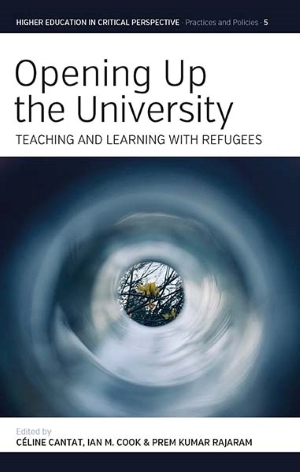 Through a series of empirically and theoretically informed reflections, Opening Up the University offers insights into the process of setting up and running programs that cater to displaced students. Including contributions from educators, administrators, practitioners, and students, this expansive collected volume aims to inspire and question those who are considering creating their own interventions, speaking to policy makers and university administrators on specific points relating to the access and success of refugees in higher education, and suggests concrete avenues for further action within existing academic structures.
Through a series of empirically and theoretically informed reflections, Opening Up the University offers insights into the process of setting up and running programs that cater to displaced students. Including contributions from educators, administrators, practitioners, and students, this expansive collected volume aims to inspire and question those who are considering creating their own interventions, speaking to policy makers and university administrators on specific points relating to the access and success of refugees in higher education, and suggests concrete avenues for further action within existing academic structures.
Piro Rexhepi. 2022. White Enclosures: Racial Capitalism and Coloniality along the Balkan Route. Duke University Press
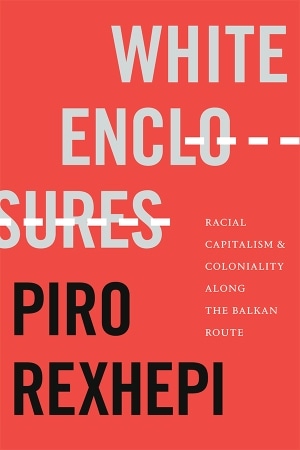 For all its history of intersecting empires, the Balkans has been rarely framed as a global site of race and coloniality. This, as Piro Rexhepi argues in White Enclosures is not surprising, given the perception of the Balkans as colorblind and raceless, a project that spans post-Ottoman racial formations, transverses Socialist modernity and is negotiated anew in the process of postsocialist Euro-Atlantic integration. Connecting severed colonial histories from the vantage point of body politic, Rexhepi turns to the borderland zones of the Balkans to trace past and present geopolitical attempts of walling whiteness. From efforts to straighten the sexualities of post-Ottoman Muslim subjects, to Yugoslav nonaligned solidarities between Muslims of the second and third world, to Roma displacement and contemporary emergence of refugee carceral technologies along the Balkan Route, Rexhepi points not only to the epistemic erasures that maintain the fantasy of whiteness but also to the disruption emanating from the solidarities between queer- and transpeople that fold the Balkans back into global efforts to resist the politics of racial capitalism.
For all its history of intersecting empires, the Balkans has been rarely framed as a global site of race and coloniality. This, as Piro Rexhepi argues in White Enclosures is not surprising, given the perception of the Balkans as colorblind and raceless, a project that spans post-Ottoman racial formations, transverses Socialist modernity and is negotiated anew in the process of postsocialist Euro-Atlantic integration. Connecting severed colonial histories from the vantage point of body politic, Rexhepi turns to the borderland zones of the Balkans to trace past and present geopolitical attempts of walling whiteness. From efforts to straighten the sexualities of post-Ottoman Muslim subjects, to Yugoslav nonaligned solidarities between Muslims of the second and third world, to Roma displacement and contemporary emergence of refugee carceral technologies along the Balkan Route, Rexhepi points not only to the epistemic erasures that maintain the fantasy of whiteness but also to the disruption emanating from the solidarities between queer- and transpeople that fold the Balkans back into global efforts to resist the politics of racial capitalism.
Julia Caroline Morris. 2023. Asylum and Extraction in the Republic of Nauru. Cornell University Press.
Asylum and Extraction in the Republic of Nauru provides an extraordinary glimpse into the remote and difficult-to-access island of Nauru, exploring the realities of Nauru’s offshore asylum arrangement and its impact on islanders, workforces, and migrant populations. Drawing on extensive fieldwork in Nauru, Australia, and Geneva, as well as a deep dive into the British Phosphate Commission archives, Julia Caroline Morris charts the island’s colonial connection to phosphate through to a new industrial sector in asylum. She explores how this extractive industry is peopled by an ever-shifting cast of refugee lawyers, social workers, clinicians, policy makers, and academics globally and how the very structures of Nauru’s colonial phosphate industry and the legacy of the “phosphateer” era made it easy for a new human extractive sector to take root on the island.
By detailing the making of and social life of Nauru’s asylum system, Morris shows the institutional fabric, discourses, and rhetoric that inform the governance of migration around the world. As similar practices of offshoring and outsourcing asylum have become popular worldwide, they are enabled by the mobile labor and expertise of transnational refugee industry workers who carry out the necessary daily operations. Asylum and Extraction in the Republic of Nauru goes behind the scenes to shed light on the everyday running of the offshore asylum industry in Nauru and uncover what really happens underneath the headlines. Morris illuminates how refugee rights activism and #RefugeesWelcome-style movements are caught up in the hardening of border enforcement operations worldwide, calling for freedom of movement that goes beyond adjudicating hierarchies of suffering.
Enríquez, Laura J. Children of the Revolution: Violence, Inequality, and Hope in Nicaraguan Migration. Stanford University Press, 2022.
 Andrea, Silvia, Ana, and Pamela were impoverished youth when the Sandinista revolution took hold in Nicaragua in 1979. Against the backdrop of a war and economic crisis, the revolution gave them hope of a better future — if not for themselves, then for their children. But, when it became clear that their hopes were in vain, they chose to emigrate. Children of the Revolution tells these four women’s stories up to their adulthood in Italy. Laura J. Enríquez’s compassionate account highlights the particularities of each woman’s narrative, and shows how their lives were shaped by social factors such as their class, gender, race, ethnicity, and immigration status. These factors limited the options available to them, even as the women challenged the structures and violence surrounding them. By extending the story to include the children, and now grandchildren, of the four women, Enríquez demonstrates how their work abroad provided opportunities for their families that they themselves never had. Hence, these stories reveal that even when a revolution fails to fundamentally transform a society in a lasting way, seeds of change may yet take hold.
Andrea, Silvia, Ana, and Pamela were impoverished youth when the Sandinista revolution took hold in Nicaragua in 1979. Against the backdrop of a war and economic crisis, the revolution gave them hope of a better future — if not for themselves, then for their children. But, when it became clear that their hopes were in vain, they chose to emigrate. Children of the Revolution tells these four women’s stories up to their adulthood in Italy. Laura J. Enríquez’s compassionate account highlights the particularities of each woman’s narrative, and shows how their lives were shaped by social factors such as their class, gender, race, ethnicity, and immigration status. These factors limited the options available to them, even as the women challenged the structures and violence surrounding them. By extending the story to include the children, and now grandchildren, of the four women, Enríquez demonstrates how their work abroad provided opportunities for their families that they themselves never had. Hence, these stories reveal that even when a revolution fails to fundamentally transform a society in a lasting way, seeds of change may yet take hold.
Twigt, Mirjam. Mediated Lives: Waiting and Hope Among Iraqi Refugees in Jordan. Berghahn, 2022.
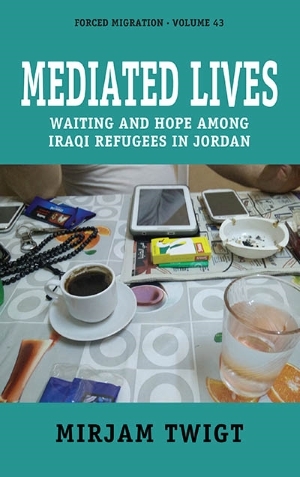 Using the example of Iraqi refugees in Jordan’s capital of Amman, this book describes how information and communication technologies (ICTs) play out in the everyday experiences of urban refugees, geographically located in the Global South, and shows how interactions between online and offline spaces are key for making sense of the humanitarian regime, for carving out a sense of home and for sustaining hope. This book paints a humanizing account of making do amid legal marginalization, prolonged insecurity, and the proliferation of digital technologies.
Using the example of Iraqi refugees in Jordan’s capital of Amman, this book describes how information and communication technologies (ICTs) play out in the everyday experiences of urban refugees, geographically located in the Global South, and shows how interactions between online and offline spaces are key for making sense of the humanitarian regime, for carving out a sense of home and for sustaining hope. This book paints a humanizing account of making do amid legal marginalization, prolonged insecurity, and the proliferation of digital technologies.
Featured image by Alexander Dodd (courtesy of pexels.com)

